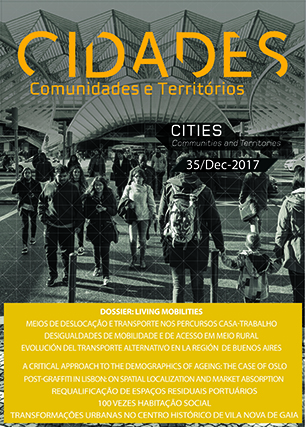A gender reading on rural mobility and accessibility
Keywords:
gender, mobility, accessibility, countrysideAbstract
Nowadays there are still strong asymmetries in the relationship with territory (Carmo, 2014), and in Portugal the inner country has been for several decades the scene of depopulation and loss of services phenomena (Fermisson, 2000). At the same time, the relationship between gender and mobility has specific characteristics since women have different needs and uses of mobility and transportation and face specific obstacles (Hanson, 2013; Sales Oliveira, 2014). This article discusses both these questions and tries to address the issue of rural mobility and accessibility from a gender perspective in the Portuguese context. In order to develop an exploratory approach the methodological option was a case study, using the techniques of survey and mobility mapping, of a village in Beira Interior. We found a social composition with greater diversity than expected but still with a strong presence of elderly people and low qualifications. Ownership of a driving license and a private vehicle is an unequal resource and a central element for the asymmetry of mobility patterns and profiles. However, contrary to what could be expected, we cannot say that women experience less mobility than men, since although they are the ones who do not have a driving license or a private vehicle, they are also the ones who most often use other mobility resources in which their social networks represent an important factor.
Downloads
Published
Issue
Section
License
CIDADES, Comunidades e Territórios by DINÂMIA'CET-Iscte is licensed under a CC-BY licence.






